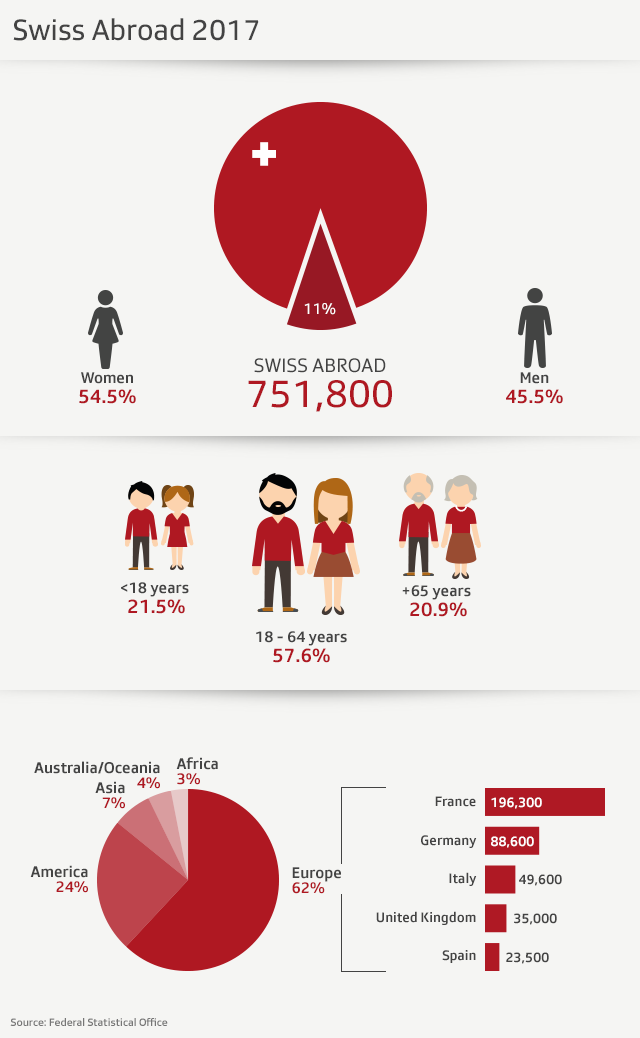
Why expatriate Swiss seldom vote

More than half of the Swiss electorate do not take part in national elections. Turnout among the Swiss Abroad is particularly low.
Paradoxically, direct democracy is one of the biggest reasons for low turnout in elections to elect parliamentary representativesExternal link, as the Swiss can vote on various policy issues in initiatives External linkand referendums External linkup to four times a year.
This reduces the significance of national elections. In a survey, the second-most cited reason given by those who stayed away from such elections was that referendums and initiatives offer a greater opportunity to wield influence. This is reinforced by the fact that the Swiss government is very stable compared with many other democracies, and that all the big parties are represented in the cabinet. In short, federal elections in Switzerland are just not seen as that important.
Given that there are usually four votes on referendums and initiatives every year, generally people devote more time to political issues than in other countries. As a result, Swiss citizens are more selective about their participation and where they focus their efforts.
Non-voting expatriates
For years, the level of participation in elections has been much lower among the Swiss Abroad than for citizens living in the country.
There are several reasons for this. First, expatriates must register to vote, which creates a certain hurdle.
“In the past, Swiss abroad had to register every four years,” said Ariane RustichelliExternal link, director of the Organisation of the Swiss Abroad (OSA).External link This hurdle has since been removed. Now they only have to register once.
“That has made voting much easier for expatriates,” Rustichelli said.
Even so, only 142,000 of the 762,000 Swiss expatriatesExternal link were registered to vote in 2015.

Far from Swiss realities
Of the expatriate Swiss who were registered, only 13-32% actually voted in 2015 – compared to a total turnout that varied between 37-60%, depending on the canton. The turnout among the whole expat Swiss community was only 4.5%.
Of course, voting involves more effort for expatriates. They have to post their envelopes on time, while Swiss living in the country can run to the polling station at the last moment, if necessary. But that cannot be the only reason.
“The only expatriates who go to vote are those who are really interested in Swiss politics,” said Rustichelli. She added that this legitimises the voting rights of expatriate Swiss, which have recently been thrown into doubt.
“Some expatriates live a long way from Swiss realities,” said Rustichelli. These expatriates often choose to limit their voting. “They don’t want to have a voice on issues that don’t affect their lives.”
There is also a very banal but extremely infuriating reason.
“Many expatriate Swiss get the documents too late and can’t vote as a result,” Rustichelli said.
Researching the causes
Rustichelli says that more data is needed to investigate expats’ abstinence in elections. “We don’t have enough information about it,” she said, adding that it should be the task of university researchers to solve this.
One scholar who researches the voting behaviour of Swiss expatriates is Thomas Milic at the Centre for Democracy Studies Aarau (ZDA)External link. He gives another reason why Swiss expatriates vote less often than Swiss living in the country: election campaigns, which can increase turnout enormously in Switzerland, do not reach them abroad.
“The Swiss Abroad have to be proactive and seek out information, for example via swissinfo.ch, while Swiss living in the country walk past election posters all the time,” Milic said. “In Switzerland, there are sharp fluctuations in turnout, while turnout among expatriate Swiss is noticeably stable.”
In that sense, expatriates are more reliable voters – those who cast their ballot do so every time.
Milic says that the fact that Swiss Abroad generally have fewer daily discussions about Swiss politics whether at home or at work, also plays a role. Therefore, there is less impetus for them to vote, he adds.

Translated by Catherine Hickley

In compliance with the JTI standards
More: SWI swissinfo.ch certified by the Journalism Trust Initiative


























You can find an overview of ongoing debates with our journalists here . Please join us!
If you want to start a conversation about a topic raised in this article or want to report factual errors, email us at english@swissinfo.ch.